【新】PEP六年级英语上册知识点总结
新版PEP小学英语六年级上册1-6单元知识点总结
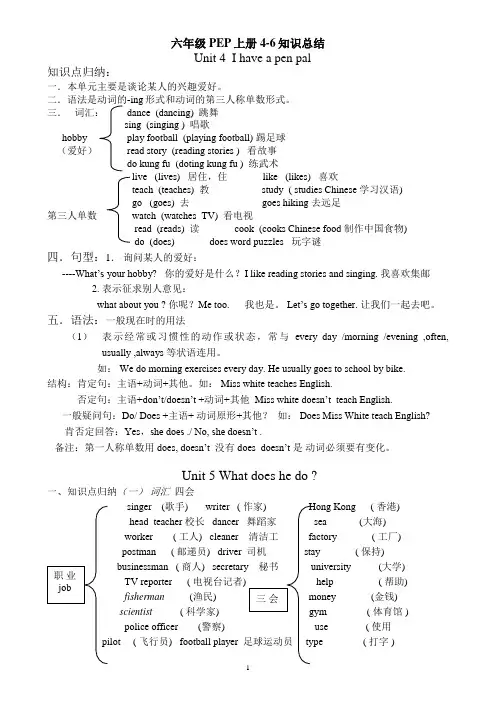
六年级PEP 上册4-6知识总结Unit 4 I have a pen pal知识点归纳:一.本单元主要是谈论某人的兴趣爱好。
二.语法是动词的-ing 形式和动词的第三人称单数形式。
三. 词汇: dance (dancing) 跳舞 sing (singing ) 唱歌hobby play football (playing football) 踢足球(爱好) read story (reading stories ) 看故事do kung fu (doting kung fu ) 练武术live (lives) 居住,住 like (likes) 喜欢 teach (teaches) 教 study ( studies Chinese 学习汉语)go (goes) 去 goes hiking 去远足第三人单数 watch (watches TV) 看电视read (reads) 读 cook (cooks Chinese food 制作中国食物)do (does) does word puzzles 玩字谜四.句型:1. 询问某人的爱好:----What’s your hobby? 你的爱好是什么?I like reading stories and singing. 我喜欢集邮2. 表示征求别人意见:what about you ? 你呢?Me too. 我也是。
Let’s go together. 让我们一起去吧。
五.语法:一般现在时的用法(1) 表示经常或习惯性的动作或状态,常与every day /morning /evening ,often,usually ,always 等状语连用。
如: We do morning exercises every day. He usually goes to school by bike.结构:肯定句:主语+动词+其他。
如: Miss white teaches English.否定句:主语+don ’t/doesn ’t +动词+其他 Miss white doesn ’t teach English.一般疑问句:Do/ Does +主语+ 动词原形+其他? 如: Does Miss White teach English?肯否定回答:Yes ,she does ./ No, she doesn’t .备注:第一人称单数用does, doesn ’t 没有does doesn ’t 是 动词必须要有变化。
新PEP小学英语六年级上册期中复习知识点总结及练习(打印版)
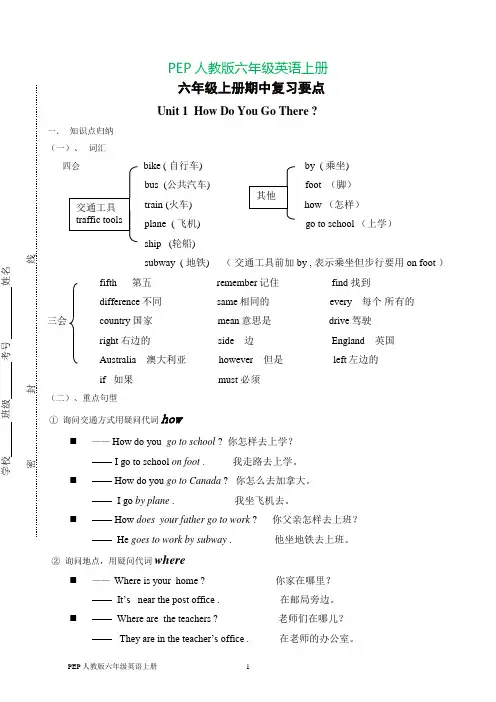
学校 班级 考号 姓名__________________________ 密 封 线PEP 人教版六年级英语上册 六年级上册期中复习要点Unit 1 How Do You Go There ?一. 知识点归纳 (一)、 词汇bike ( 自行车乘坐)公共汽车(脚)火车(怎样) 飞机(上学) 轮船)subway ( 地铁) ( 交通工具前加by , 表示乘坐但步行要用on foot )fifth 第五 remember 记住 find 找到 difference 不同 same 相同的 every 每个 所有的三会 country 国家 mean 意思是 drive 驾驶right 右边的 side 边 England 英国 Australia 澳大利亚 however 但是 left 左边的 if 如果 must 必须(二)、重点句型① 询问交通方式用疑问代词how⏹—— How do you go to school ? 你怎样去上学?—— I go to school on foot . 我走路去上学。
⏹—— How do you go to Canada ? 你怎么去加拿大。
—— I go by plane . 我坐飞机去。
⏹—— How does your father go to work ? 你父亲怎样去上班? —— He goes to work by subway . 他坐地铁去上班。
② 询问地点,用疑问代词where⏹ —— Where is your home ? 你家在哪里?—— It’s near the post office . 在邮局旁边。
⏹ —— Where are the teachers ? 老师们在哪儿? —— They are in the teacher’s office . 在老师的办公室。
人教版③问路⏹—— How can I get to Zhongshan Park ? 我怎么去中山公园?—— You can go by the No.1 bus.你可以坐一路车去。
最新人教版PEP英语六年级上册知识点归纳
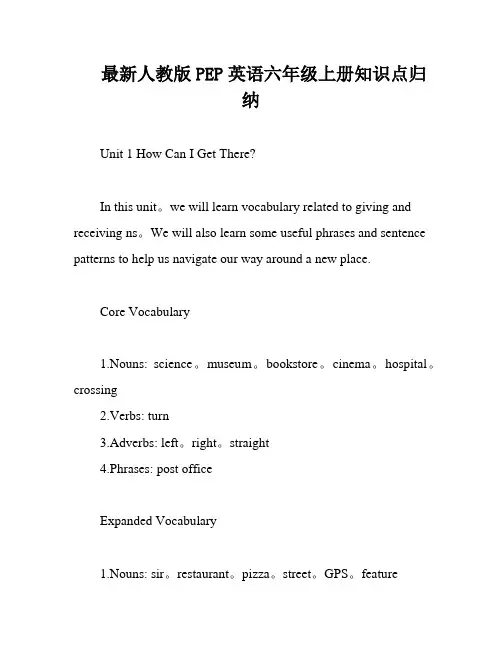
最新人教版PEP英语六年级上册知识点归纳Unit 1 How Can I Get There?In this unit。
we will learn vocabulary related to giving and receiving ns。
We will also learn some useful phrases and sentence patterns to help us navigate our way around a new place.Core Vocabulary1.Nouns: science。
museum。
bookstore。
cinema。
hospital。
crossing2.Verbs: turn3.Adverbs: left。
right。
straight4.Phrases: post officeExpanded Vocabulary1.Nouns: sir。
restaurant。
pizza。
street。
GPS。
feature2.Verbs: ask。
get。
gave。
follow。
tell3.Adjectives: interesting。
Italian。
farSentence Patterns1."Where is the ____?" - "It's next to the ____."2."How can we get there?"3."Turn left/right at the _____。
Then turn left/right at the _____."Note: Be mindful of ns and their fixed phrases.Useful Phrases1."Is there a ____?"2."There is a ____ under the ____."3."There be" sentence pattern - "There is/are ____." (Remember the principle of proximity.)By learning and practicing these vocabulary words。
新版PEP小学英语六年级上册1-6单元知识点总结
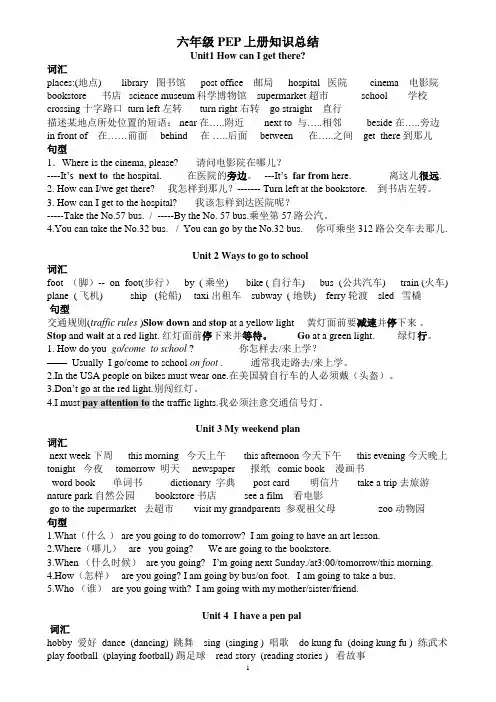
六年级PEP上册知识总结Unit1 How can I get there?词汇places:(地点) library 图书馆 post office 邮局 hospital 医院 cinema 电影院bookstore 书店 science museum科学博物馆 supermarket 超市 school 学校crossing 十字路口 turn left 左转 turn right 右转 go straight 直行描述某地点所处位置的短语: near 在…..附近 next to 与…..相邻 beside 在…..旁边in front of 在……前面 behind 在…..后面 between 在…..之间 get there 到那儿句型1.Where is the cinema, please? 请问电影院在哪儿?----It’s next to the hospital. 在医院的旁边。
---It’s far from here. 离这儿很远.2. How can I/we get there? 我怎样到那儿?------- Turn left at the bookstore. 到书店左转。
3. How can I get to the hospital? 我该怎样到达医院呢?-----Take the No.57 bus. / -----By the No. 57 bus.乘坐第57路公汽。
4.You can take the No.32 bus. / You can go by the No.32 bus. 你可乘坐312路公交车去那儿.Unit 2 Ways to go to school词汇foot (脚)-- on foot(步行) by ( 乘坐) bike ( 自行车) bus (公共汽车) train (火车) plane ( 飞机) ship (轮船) taxi 出租车 subway ( 地铁) ferry 轮渡 sled 雪橇句型交通规则(traffic rules )Slow down and stop at a yellow light 黄灯面前要减速并停下来。
六年级上册英语知识点总结归纳(PEP新版)
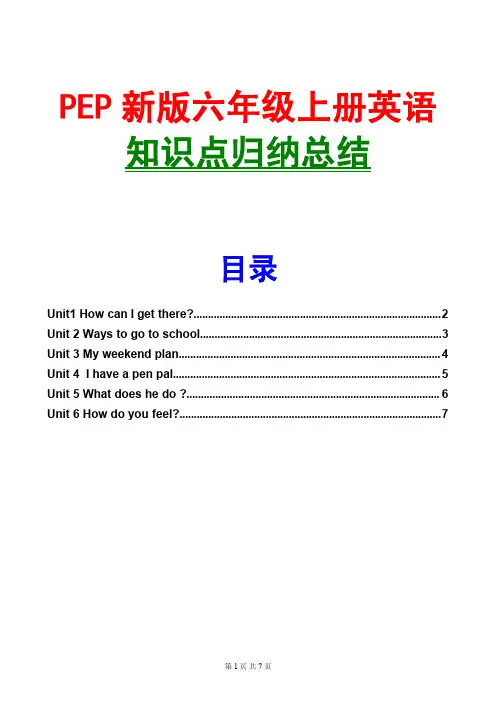
PEP新版六年级上册英语知识点归纳总结目录Unit1How can I get there? (2)Unit2Ways to go to school (3)Unit3My weekend plan (4)Unit4I have a pen pal (5)Unit5What does he do? (6)Unit6How do you feel? (7)Unit1How can I get there?library图书馆north(北)post office邮局hospital医院turn left左转turn right右转places:cinema电影院(地点)bookstore书店(东)east west(西) science museum科学博物馆pet hospital宠物医院crossing十字路口school学校south(南)shoe store/shop鞋店supermarket超市go straight直行一、问路1.Where is the cinema,please?请问电影院在哪儿?next to the hospital.在医院的旁边。
in front of the school.在学校的前面.behind the park在公园的后面It’s near the zoo.在动物园的附近.on the right/left of the bookstore.在书店的左/右边.east of the bank.在银行的东边.far from here.离这儿很远.2.Excuse me,is there a cinema near here请问这附近有电影院吗?Yes,there is./No,there isn’t.有./没有。
3.How can I get to the hospital?我该怎样到达医院呢?Take the No.57bus.乘坐57路公汽。
二、指引路1.You can take the No.312bus.你可乘坐312路公交车去那儿.2.Go straight for three minutes.向前直走3分钟.3.Turn right/left at the…在…地方向右/左转.4.Walk east/west/south/north for…minutes.朝东/西/南/北/走…分钟.三、Is it far from here?离这儿远吗?Yes,it is./No,it isn’t.是的,很远/不是,很远。
新版PEP小学英语六年级上册1-6单元知识点总结
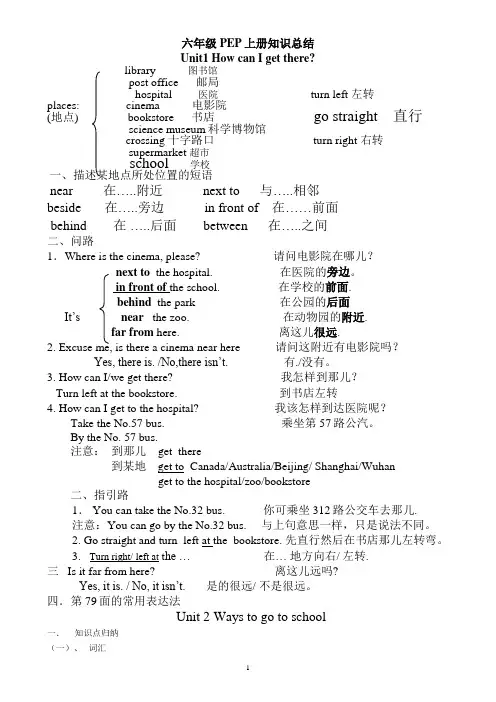
六年级PEP上册知识总结Unit1 How can I get there?library 图书馆post office 邮局hospital 医院turn left 左转places: cinema 电影院(地点) bookstore 书店go straight 直行science museum科学博物馆crossing 十字路口 turn right 右转supermarket 超市school 学校一、描述某地点所处位置的短语near 在…..附近 next to 与…..相邻beside 在…..旁边 in front of 在……前面behind 在…..后面 between 在…..之间二、问路1.Where is the cinema, please? 请问电影院在哪儿?next to the hospital. 在医院的旁边。
in front of the school. 在学校的前面.behind the park 在公园的后面It’s near the zoo. 在动物园的附近.far from here. 离这儿很远.2. Excuse me, is there a cinema near here 请问这附近有电影院吗?Yes, there is. /No,there isn’t. 有./没有。
3. How can I/we get there? 我怎样到那儿?Turn left at the bookstore. 到书店左转4. How can I get to the hospital? 我该怎样到达医院呢?Take the No.57 bus. 乘坐第57路公汽。
By the No. 57 bus.注意:到那儿 get there到某地 get to Canada/Australia/Beijing/ Shanghai/Wuhanget to the hospital/zoo/bookstore二、指引路1. You can take the No.32 bus. 你可乘坐312路公交车去那儿.注意:You can go by the No.32 bus. 与上句意思一样,只是说法不同。
(完整word版)pep六年级上册英语-各单元知识点总结
Unit 1 How can I get there?一、重点单词和短语(1)science museum科学博物馆post office邮局bookstore书店cinema电影院hospital医院restaurant餐馆bank银行bus stop公交车站lake湖library图书馆crossing十字路口school学校park公园garden花园hotel旅馆zoo动物园(2)turn left向左转turn right向右转go straight直走near在…附近next to紧挨着/ 与…相邻far from 离…远behind在…后面in front of在…前面between…and…在…和…之间二、按要求写单词hot(反义词)cold cool(反义词)warm too(同音词)to/twosea(同音词)see can not(缩写)can't right(反词)left/wrongbuy(同音词)by/bye first(基数词)one four(序数词)fourthdid (原形)do /does three(序数词)third三、重点句型分析1. Where is the museum shop? 2。
It’s near the park.3。
How can we get there?询问“怎样去某地”Turn left at the bookstore. Then turn right at the hospital。
5。
Is the hospital far from here? Yes, it is。
/ No,it isn't。
Unit 2 Ways to go to school一、重点单词和短语on foot步行by bus =take a bus乘公交车by plane乘飞机by ship乘船by taxi 乘出租车by subway 乘地铁by train乘火车by bike骑自行车slow down 慢下来stop and wait停下来等pay attention to注意cross the road横穿马路traffic light通信号灯at home在家look right向右看look at朝…看play with和…一起玩二、按要求写单词go (反义词)come foot(复数)feet child(复数)childrenearly(反义词)late good(反义词)bad take(反义词)bringslow(反义词)quick/fast go(过去式)went do(过去式)diddo(第三人称单数) does go(第三人称单数)goessame 相同的(反义词)different不同的miss(过去式)missedwrong 错误(反义词)right正确can(否定形式)can’t三、重点句型分析1。
PEP初中英语六年级上册知识点归纳
PEP初中英语六年级上册知识点归纳一、语法篇1. Be动词:是,am,are,was,were,been。
2. 疑问词:what,where,when,why,how,who。
3. 情态动词:can,could,may,might,should,must。
4. 祈使句:动词原形。
5. 一般现在时:主语+V(原形)+其他。
6. 现在进行时:主语+be+V(ing)+其他。
7. 一般过去时:主语+V(过去式)+其他。
8. 过去进行时:主语+was/were+V(ing)+其他。
9. 将来时:主语+will/shall+V(原形)+其他。
10. 过去将来时:主语+would/should+V(原形)+其他。
二、词汇篇1. 人称代词:I,you,he,she,it,we,they。
2. 物主代词:my,your,his,her,its,our,their。
3. 形容词:big,small,long,short,tall,fat,thin,heavy,light,old,young。
4. 副词:often,seldom,always,never,sometimes,very,too,so,quite。
5. 数词:序数词(first,second,third)和基数词(one,two,three)。
6. 时间词:week,month,year,morning,afternoon,evening,night。
7. 颜色词:red,green,blue,yellow,white,black。
8. 动词:play,listen,watch,read,write,swim,dance,sing,draw,speak。
9. 名词:book,desk,chair,table,bed,door,window,picture,pen,ruler,bottle,bag,pencil case。
三、对话篇3. Talking about family: How many people are there in your family? What do your parents do?4. Talking about hobbies: Do you like…? What’s your favourite…?5. Talking about school: What subjects do you study at school? Who’s your favourite teacher?6. Talking about daily routines: What time do you get up/go to bed? What do you do on weekends?希望以上知识点归纳对您有所帮助。
新人教(PEP)六年级英语上册Unit 3 My weekend plan知识点归纳
新人教(PEP)六年级英语上册Unit 3 My weekend plan知识点归纳一.知识点归纳(一)、词汇四会next week 下周报纸this morning 今天上午comic book 漫画书this afternoon 今天下午word book 单词书this evening 今天晚上dict ionary 字典tonight今夜tomorrow 明天post card 明信片take a trip 去旅游theme park 主题公园see a film 看电影others 宠物店go to the supermarket 去看电影(其他)supermarket 超市Visit my grandparents 参观祖父母鞋店二、重点句式和句型:本单元中出现的一个重点语法是一般将来时:表示将要发生的动作或状态,常和表示将来的时间连用。
构成:陈述肯定句:主语+ be going to + 动词原形+ 其他否定句:主语+ be + not going to +动词原形+其他一般疑问句:主语+ Be+ 主语+ goi n g to +动词原形+其他特殊疑问句:特殊疑问词+ 一般疑问句?例子I am(not)going t o the bookstore by bus this afternoon Are you going to the bookstore by bus this afternoon? No, I’m not. /Yes,I amWhat are you going to do this afternoon?Where are you going this afternoon?How are you going to the bookstore this afternoon? When are you going to the booksto re by bus?三、重点句型:1. we’re going to see a film about space travel!我们将要去看关于火星之旅的电影。
(完整版)新版pep六年级上册英语-各单元知识点总结
Unit 1 How can I get there?一:重点单词和短语Science科学, museum博物馆, post office , bookstore, cinema, hospitalLondon Eye伦敦眼, stomach胃, crossing十字路口, turn left, turn right,go straight=walk straight直走. next to紧挨着/与...相邻far from(离...远),near在...附近behind(在...后面)in front of(在...前面)between…and…(在...和...之间)二:按要求写单词:hot(反义词)cold , cool(反义词)warm,too(同音词)to/two can not(缩写)can’tright(反义词)left/wrong buy(同音词)by/bye sea(同音词)see first(基数词)onefour(序数词)fourth did (原形)do /does three(序数词)third give(过去式)gave三:重点句型分析1. Where is the museum shop?此问句是由特殊疑问词where 引导的一个特殊疑问句,where意为“在哪里,到哪里”,用来询问地点,放在句子的开头。
询问“某人或某物在哪里”的基本句型是:“ Where +is/are+ 主语?”,where is 后接名词或代词的单数形式,where are 后接名词或代词的复数形式。
表示地点的词:museum博物馆, post office 邮局, bookstore书店, cinema电影院, hospital医院restaurant餐馆bank银行bus stop公交车站lake湖library 图书馆zoo动物园school学校park公园garden花园hotel旅馆2. It’s near the door.此句中near是表示位置的介词,意为“旁边,附近” ,其同义句是:It’s next to the door.它在门的旁边。
- 1、下载文档前请自行甄别文档内容的完整性,平台不提供额外的编辑、内容补充、找答案等附加服务。
- 2、"仅部分预览"的文档,不可在线预览部分如存在完整性等问题,可反馈申请退款(可完整预览的文档不适用该条件!)。
- 3、如文档侵犯您的权益,请联系客服反馈,我们会尽快为您处理(人工客服工作时间:9:00-18:30)。
Unit1 How can Igetthere? 我怎样到达这里?重点单词:where哪里how 怎样can能够near近的ask 问tell 告诉far远的science 科学hospital 医院museum 博物馆post office 邮局library图书馆bookstore 书店usually通常sometimes有时候often 经常know知道near旁边nextto旁边(比nea r更近)crossing十字路口turn left向左转turn right 向右转go straight直走in front of在…的前面behind在...的后面重点句子:1.How doyou goto school?你是怎样去上学的?2.where is the restaurant? 餐馆在哪里?3.Usually I go toschool on foot. 我通常走路去上学。
4. SometimesIgoby bike.有时候我骑自行车去。
、5.问路之前,出于礼貌,我们要说“Excuse me”与后面的句子要用标点符号隔开。
6.Lookatthe traffic lights,remember thetrafficrules.看着交通灯,记住交通规则。
7. Stop at a redlight. Waitat a yellow light. Goat a greenlight.红灯停。
黄灯等一等。
绿灯行。
8. Redmeans stop,yellow means wait, green means go.红色的意思是停止,黄色的意思是等待,绿色的意思是通行。
9. Howcan I getto thepark?我该怎样到达公园呢?10. You can gobytheNo. 15bus.你可以坐15路公交车去。
重点知识:1.坐某种交通工具用by,例如:bybike, by train。
而走路用“on”例如on foot.2.国家名字,地方名字第一个字母要大些:例如:Canada加拿大,China中国, America美国,England英国,Australia澳大利亚3.频度副词是表示做的次数多少的词语。
从多到少依次排列为: always总是,usually通常,often经常,sometimes有时候,never从不。
频度副词可以放在句首,也可以放在人称后面。
例如:UsuallyI go to school by bus. = Iusuallygo to school by bus.4.near近的,far远的。
这两个词是一对反义词。
注意: not near= far,not far= near.5.时间前面用at. 例如:在三点钟:at 3 o’clock.6.交通灯trafficlights,交通规则:traffic rules。
这大部分的国家都是靠右行驶的:drivers driveon the right side ofthe road.记住England andAustralia, drivers drive on the leftside of theroad.英国和澳大利亚,司机是靠左行驶的。
7.onfoot=walk, 都是走路的意思,但是用法不同,onfoot用在句子末尾,而walk用法与go相同,可以代替go的位置。
例如:走路回家:walk home 走路去上学:walk toschoo l走路去上班walkto work走路去医院walk tothe hospitalUnit2 Ways togo to school 上学的方法重点单词:by bike骑自行车by bus坐公车by train坐火车by plane坐飞机byship坐轮船by subway坐地铁by taxi乘出租车on foot=walk 走路Excuse me打扰一下please请buy买want to想要apairof一双get on 上车get off下车turnleft左转turnright右转am上午pm下午no w现在look for寻找top停止wait等待get to到达driver司机must必须重点句子:1.Let’s go to the naturepark,让我们一起去公园吧!2.How dowe get there?我们怎样到达这里?Bybus乘公交。
3.The park is over there,公园在那里。
4.Let’sgo .我们一起出发吧!5.Slow down andstopata yellow light.黄灯等一等。
6.Stop and waitat a redlight.红灯停。
7.Go atagreen light.绿灯行。
重点知识:1.Is there 开头的问句怎么回答呢?例如:Is therea cinema near here? 只要把前两个词语的顺序换一下就可以了,肯定回答是:Yes,there is.否定:No, there isn’t.2.buy 和by的区别,这两个词语发音相同,但是意思完全不同,by:乘,坐buy:买3.地点名词前面一定要有the,例如: Where is thecinema? How can I getto the hospital?4.时间前面用at.例如:在三点钟: at3o’clock.;一段时间前面用for,例如:三分钟for 3minutes. 星期前面用on,例如:on Monday, onTuesday, on Wednesday, on Thursday, on Friday,on Saturday, on Sunday.5.在表达第几路公交车时,注意No.的书写,N要大写,后面别少了一点!!!6.在哪里上下车,在哪里左右转,都用介词at,例如:Get on/offat the cinema.在电影院的地方上下车。
Turn left/ right at the bookstore.在书店的地方左右转。
7.by the No. 12 bus= take the No. 12 bus.坐12路公交车Unit3 What are you goingtodo?你将要做什么?重点单词:take a trip旅行read a magazine读一本杂志go tothe cinema去看电影this morning今天上午this afternoon今天下午this evening今天晚上nextweek下个星期tomorrow明天tonight今晚busy忙碌的go home回家postcard明信片comic book漫画书newspaper报纸dictionary字典plant trees种树重点句子:1.Whatareyou going to do on theweekend? 周末你将要做什么?2.I’m goingto visit my grandparents thisweekend. 我将要去拜访我的祖父母。
3.I’mgoing to have abusy weekend! 我将要度过一个忙碌的周末。
4.I’m goingtothe supermarketwithmymother. 我将要和我妈妈去超市。
5.Whereareyou going this afternoon? 今天下午你将要去哪?6.I’m going to thebookstore.我将去书店。
7.What areyougoing to buy? 你将要买什么?8.I’m goingto buy a comic book. 我将要去买一本漫画书。
9.When areyou going? 你将什么时候去?10.I’m going at3o’clock. 我将三点钟去。
11.Whatare you goingtobe?I’mgoing to be a policeman.你将要成为什么样的人?我将要成为一名警察。
重点知识:1.时间往往放在句子的末尾。
例如:What are you goingto do this evening?2.goto school去上学,goto work去上班,goto the cinema去看电影,go后面都要有to,但是要注意“回家”这个词组是:gohome,中间绝对没有to。
3.with: 和,后面往往跟人。
例如:I’m going to playfootball with myfriends. 我将要和我的朋友一起去踢足球。
4.疑问词:where:哪里(地点)what:什么(东西,事情或职业)when:什么时候(时间)h ow:怎么样(交通工具)who:谁(人)why:为什么(答句中有because)Unit4 I have a pen pal 我有一个笔友重点单词:pen pal笔友riding a bike(ride)骑自行车diving(dive)跳水hob by爱好watch(watches)TV看电视playing the pipa(play)弹琵琶listening tomusic (listen )听音乐drawing pictures (draw)画画=painting(paint)climbing mountains(climb)爬山playing (play)sport 做运动playbasketball 打篮球playfootball踢足球live(lives)in B eijing居住在北京go (goes)to work去上班go(goes)tobed 睡觉go(goes) home回家teach(teaches) English教英语read (reads)newspapers读报纸gohiking 远足study Chinese研究中文cook Chinese food 做中国食物do word puzzles 猜字谜重点句子:1.What’s your hobby?你的爱好是什么?=What is your hobby?2.Whatareyour hobbies? 你的爱好是什么?3.I like reading stories.我喜欢看故事书。
4.He likescollecting stamps, too. 他也喜欢集邮。
5.Doessheteach English?她是教英语的吗? Yes,shedoes.No, she doesn’t.6.Do youlike English ? Yes, I do.No, I don’t.7My name isJohn.我是约翰。
Hisnameis Zhang Peng.他是张鹏。
